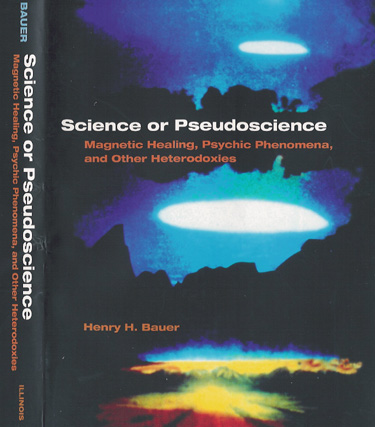Wilhelm Reich Loch Ness Monsters parapsychology
archaeoastronomy  polywater
polywater
bioelectromagnetics and life cold fusion
high-temperature superconductors N-rays
since Novermber 2000
Those and many other subjects have been called "pseudo-science" or "pathological science";
but how can you decide
whether such a subject is pseudo or whether it will turn out to be real science?
==> the often cited criterion that a theory is only scientific if it is falsifiable doesn't work and was never adopted by most philosophers; the theory of evolution, for example, isn't falsifiable.
by most philosophers; the theory of evolution, for example, isn't falsifiable.
==> the criterion that "the scientific method" must be used in real science doesn't work
==> the answer can't be that science is right and pseudo is wrong
analgesia by acupuncture ball lightning giant squid
Studying such anomalies -- doing "anomalistics" -- is different in a number of ways from studying mainstream topics in natural or social science.
Those differences are discussed in
Science or Pseudoscience:
Magnetic Healing, Psychic Phenomena, and Other Heterodoxies
Praise from reviewers:
87 Pts !!!!! Must Read (Today's Books BEST READS Public News Service August 6, 2001)
thoughtful discussion of how arguments and evidence are utilized both inside and outside of the established sciences... an interesting and controversial perspective... has insights to offer...
Bauer has thought carefully about the nature of belief, faith, and truth in the search for knowledge, and he bridges disciplines effectively. He knows his subjects, and he provides many ways to dissect and think about legitimate and illegitimate research (Stephen P. Weldon in ISIS)
calm and civilized... one cannot but respect Bauer's position. I recommend this book highly to anyone interested in anomalies, whether as believer or debunker (Russell F. Trimble in Science Books & Films)
Bauer has been accused of being both too hard on pseudoscience and too generous. You will therefore like some of the things he says and want to e-mail complaints on others (Science Frontiers)
A lively argument for "pseudoscience" not as the opposite of science, but as something that develops parallel to it and should not be dismissed out of hand. His thoughtful comparison of anomalistics and science works to illuminate the nature of science, of truth, and of knowledge seeking in general (Science Tech Book News)
fair and logical it does clarify the issues and make for interesting reading
(Mark Dionne in PopMatters Book Review)
explores the diffuse and porous borders between mainstream and unorthodoxy...
offers a measured and thoughtful assessment (Tom Bowden in techdirections)
For an unusually unbiased, yet scientific, approach to some of the subjects that are "borderland" respectable --- sometimes called pseudoscience, sometimes admitted into science, but generally still controversial, you must read this book. The most useful aspect of this book is the way that Dr. Bauer defines normal, revolutionary, premature, and "pseudo" science in terms of three facets: data, method, and theory (Hieronimus & Co. Journal)
intellectually rewarding and generally well-written... stimulate[s] new kinds of thinking
I applaud the overall scholarship and spirit (Eugene F. Mallove in Infinite Energy)
This page was last updated on: June 14, 2014
